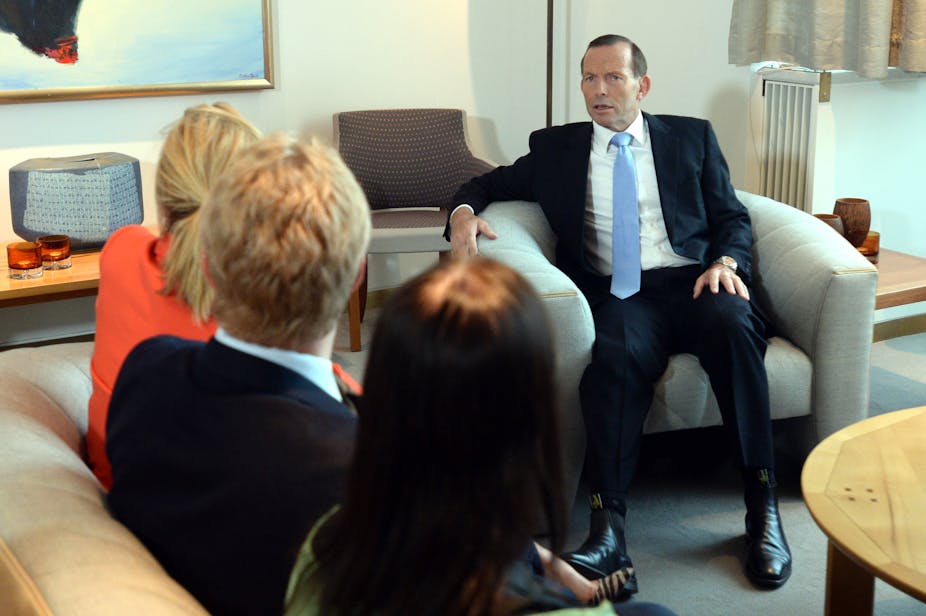On Sunday, January 25, Prime Minister Tony Abbott released a little more detail about his plans for adoption in Australia. Although specifics are still pretty thin on the ground, the announcement makes the concerns that I and others raised previously very real.
Since coming to power, Abbott has turned to lobbyists for his information on adoption and what should be done. He ignores the advice of skilled practitioners, respected Australian adoption researchers and organisations such as International Social Services (ISS) and UNICEF.
From the beginning, the approach to adoption has been clouded in secrecy and bias towards the wants of lobbyists, ignoring important stakeholders like adoptees for whose benefit adoption should be all about. The best interests of children are paramount, according to the UN conventions to which Australia is party.
There are several very worrying elements of this latest announcement.
Advocacy ‘shop’ ignores conflicts of interest
The first is the language Abbott uses. From the beginning Abbott has used the language of adoption as a service for adopters, not children. More concerning is the use of the word “shop” when he promises to:
… make it simpler to adopt children from overseas.
Words are important. “Shop” paints a picture of commercial transactions and places the emphasis on children as a commodity, which is distressing and offensive to many in the Australian adoption community, especially to adoptees. “One-stop shop” might be government lingo but its use shows a deep lack of understanding on the part of the government about adoption issues and the impact of these policies.
Second, Abbott has not named the agency that will be running this new “shop” and whose role will be to advocate for the needs of prospective adopters, not children. He said:
Prospective parents have told me they simply don’t have anyone advocating for them. Now there will be someone to guide them and support them.
Speculation is rife about lobbyist-led agencies and the potential for profit-driven trafficking in finding children for Australian families under these arrangements. The speculation is fuelled by leaks from lobbyists who have access to privileged information and by the replication of the words of lobbyists in government media releases. Intercountry adoption has already been handed over in principle in New South Wales with the accreditation of an adoption-driven lobby group announced via their online groups.
On Wednesday, the Attorney-General’s Department invited US adoption agencies to work with Australia.
Third, “trained staff will advocate on [adopting parents’] behalf”. There is no mention of the role of qualified professionals in this new “shop”. Any de-professionalisation of services that should be for children, combined with deregulation and blatant disregard for safeguards, is not in the best interests of children in Australia or overseas and has the potential to cause harm.
Abbott is handing over communications with prospective parents and the new role of advocating on their behalf for quicker adoptions with overseas countries to one agency. This is a simplification of the adoption process that ignores conflicts of interest and other ethical concerns, establishes prospective parents as customers and risks placing pressure on agencies in sending countries.
New policy based on myths
Unfortunately, I was unable to accept the invitation to go to a scholarly meeting on intercountry adoption that brought together international researchers in The Hague late last year. The reports from this forum are now available.
These expert reports clearly dispel the adoption myths that there are millions of children available for adoption and who want parents. Abbott insists on perpetuating these myths when he claims:
There are millions of children in overseas orphanages who would dearly love to have parents.
One report paints a real picture of the families who do exist and lose their children to adoption. Another report stresses that under no circumstances should private or independent adoptions such as those favoured by high-profile lobbyists take place, no adoptions should occur after disaster and the demand from Western commentators for more children is a problem.
Finally, despite assurances that changes to Australian immigration laws would relate to only a limited number of countries, the list has expanded to the United States, Poland, Vietnam, Latvia, Kenya, Bulgaria and Cambodia. Australia has effectively handed over responsibility to ensure ethical adoptions to these countries. Once again there has been little real consultation or engagement within Australia except with pro-adoption lobbyists.
I hope Australia will not join the ranks of those countries whose adoption stories are overwhelmingly negative. It is children, their families and their adoptive parents who ultimately experience the fallout when human rights and international conventions are ignored, documented concerns are ignored and policies are rushed to please those with the loudest voices.

